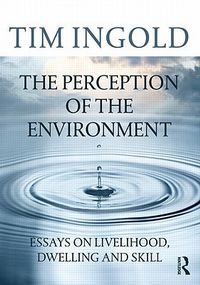
The Perception of the Environment: Essays on Livelihood, Dwelling and Skill
A Science, Academic, Theory book. Faced with an ecological crisis whose roots lie in this disengagement,...
In this work Tim Ingold offers a persuasive approach to understanding how human beings perceive their surroundings. He argues that what we are used to calling cultural variation consists, in the first place, of variations in skill. Neither innate nor acquired, skills are grown, incorporated into the human organism through practice and training in an environment. They are thus as much biological as cultural. The twenty-three essays comprising this book focus in turn on the procurement of livelihood, on what it means to 'dwell', and on the nature of skill, weaving together approaches from social anthropology, ecological psychology, developmental biology and phenomenology in a way that has never been attempted before. The book is set to revolutionise the way we think about what is 'biological' and 'cultural' in humans, about evolution and history, and indeed about what it means for human beings - at once organisms and persons - to inhabit an environment. The Perception of the Environment will be essential reading not only for anthropologists but also for biologists, psychologists, archaeologists, geographers and philosophers.
Download or read The Perception of the Environment: Essays on Livelihood, Dwelling and Skill in PDF formats. You may also find other subjects related with The Perception of the Environment: Essays on Livelihood, Dwelling and Skill.
- Filetype: PDF
- Pages: 482 pages
- ISBN: 9780415228329 / 415228328
BkO6g_mr_h8-.pdf
More About The Perception of the Environment: Essays on Livelihood, Dwelling and Skill
Faced with an ecological crisis whose roots lie in this disengagement, in the separation of human agency and social responsibility from the sphere of our direct involvement with the non-human environment, it surely behoves us to reverse this order of priority. I began with the point that while both humans and animals have histories of their mutual relations, only humans narrate such histories. But to construct a narrative, one must already dwell in the world and, in the dwelling, enter into relationships with its constituents, both human and non-human....
Meh. Didn't really hold my attention. KOBOBOOKS Changed my thinking ... about ways of seeing.











